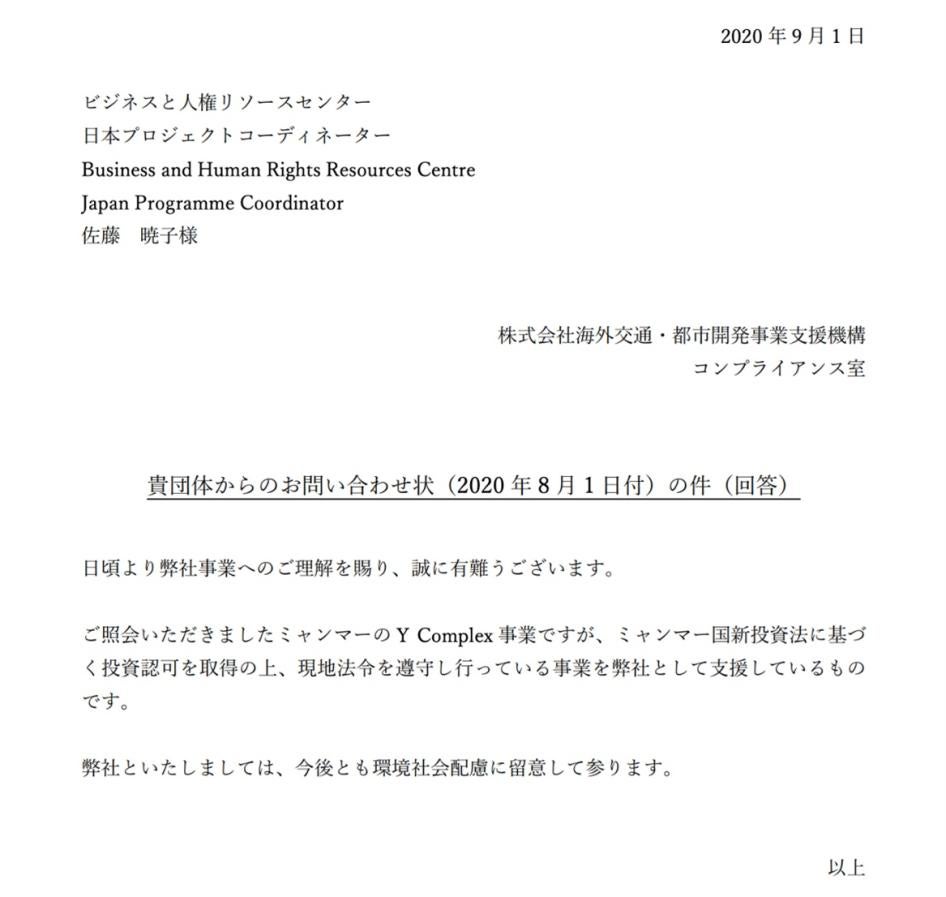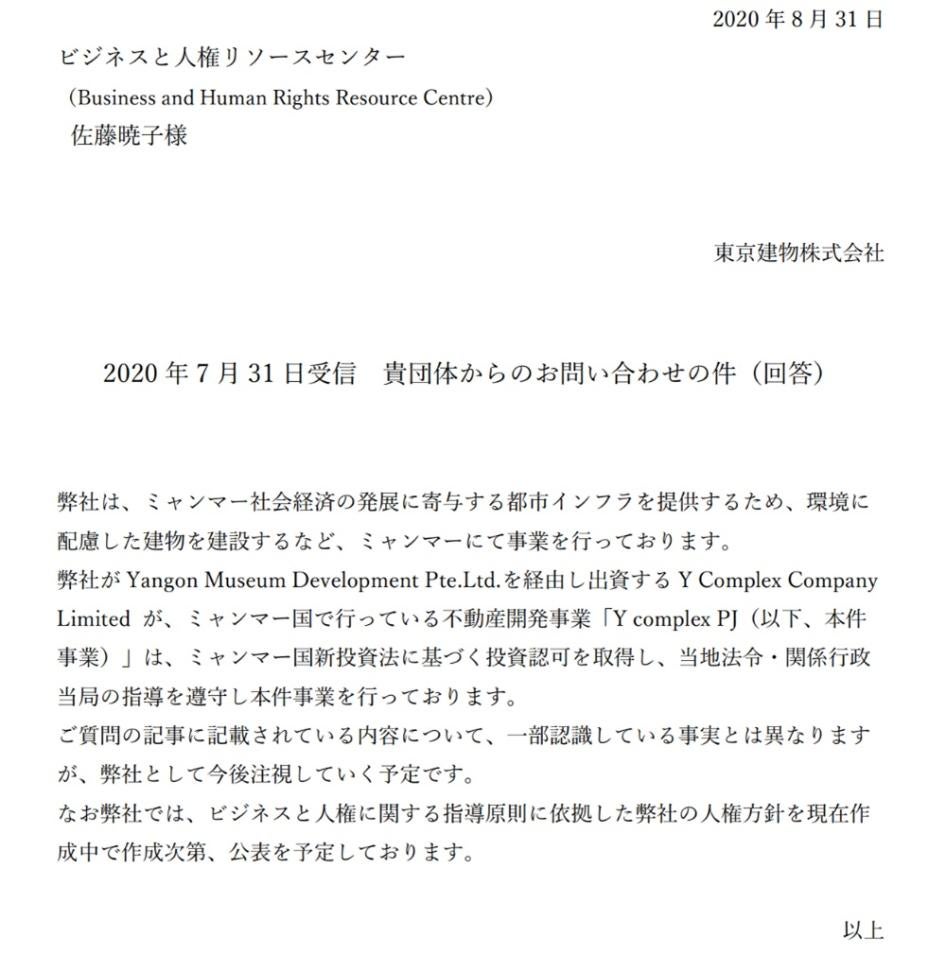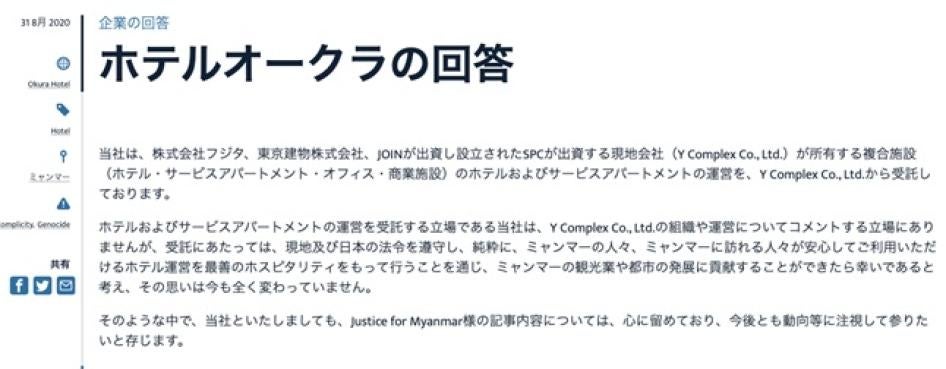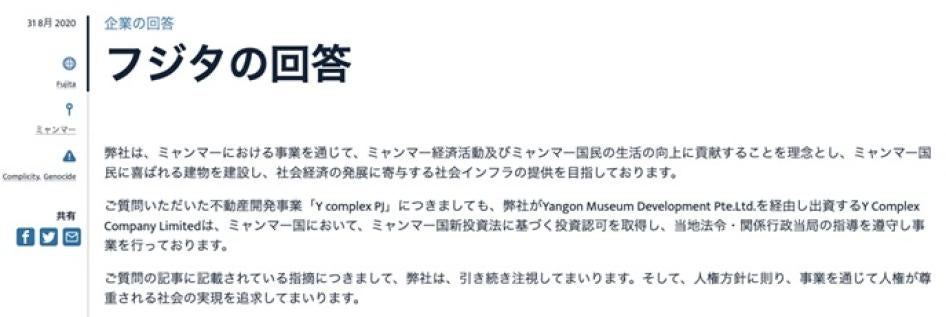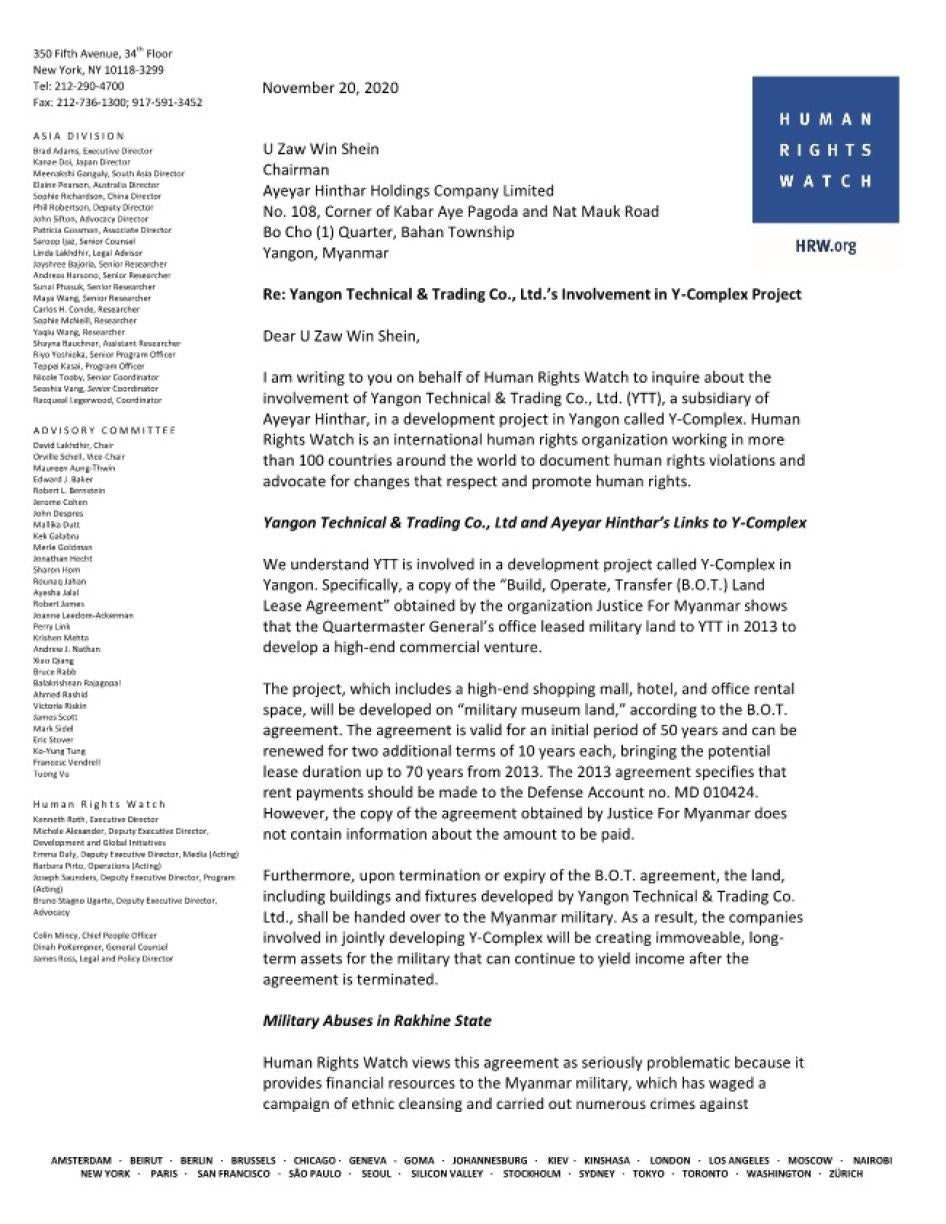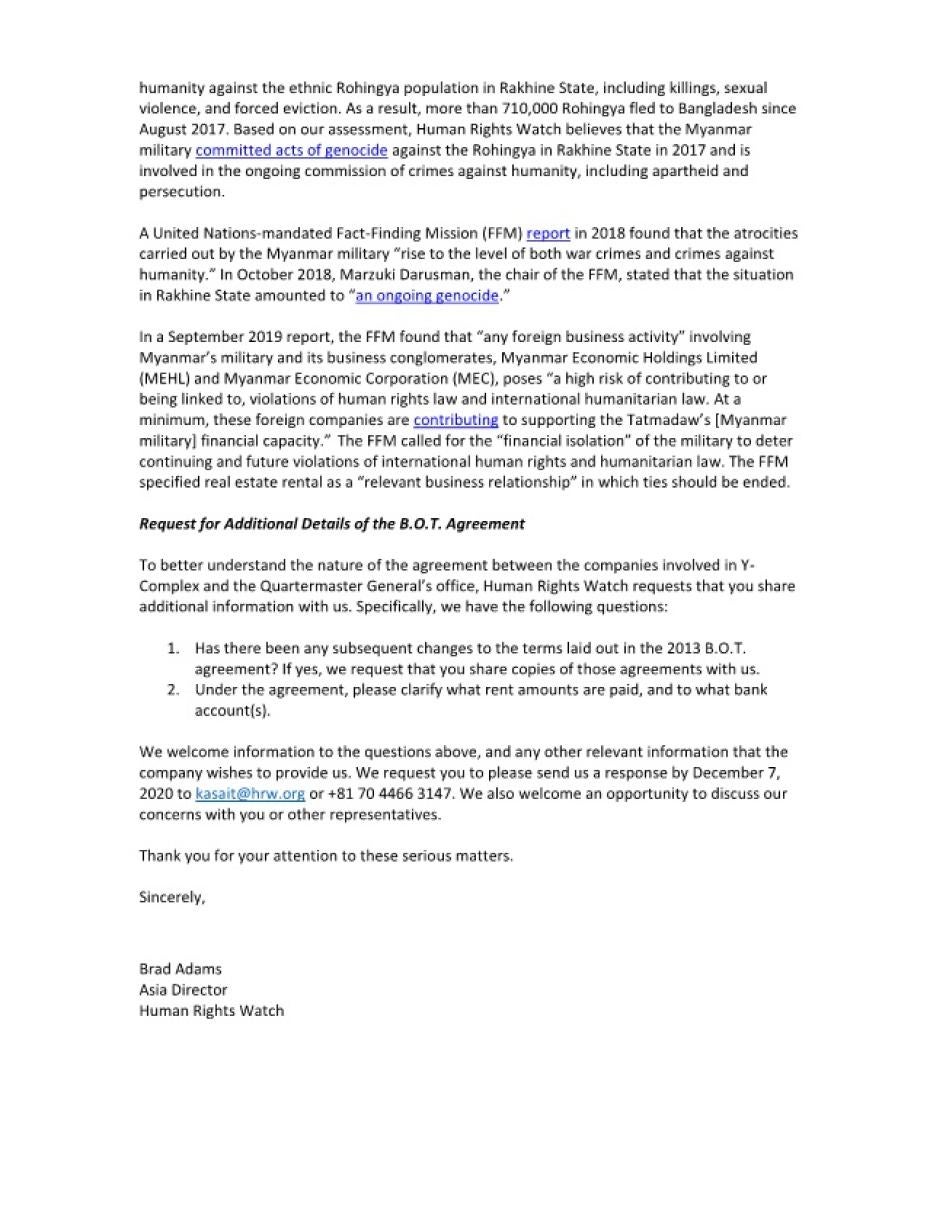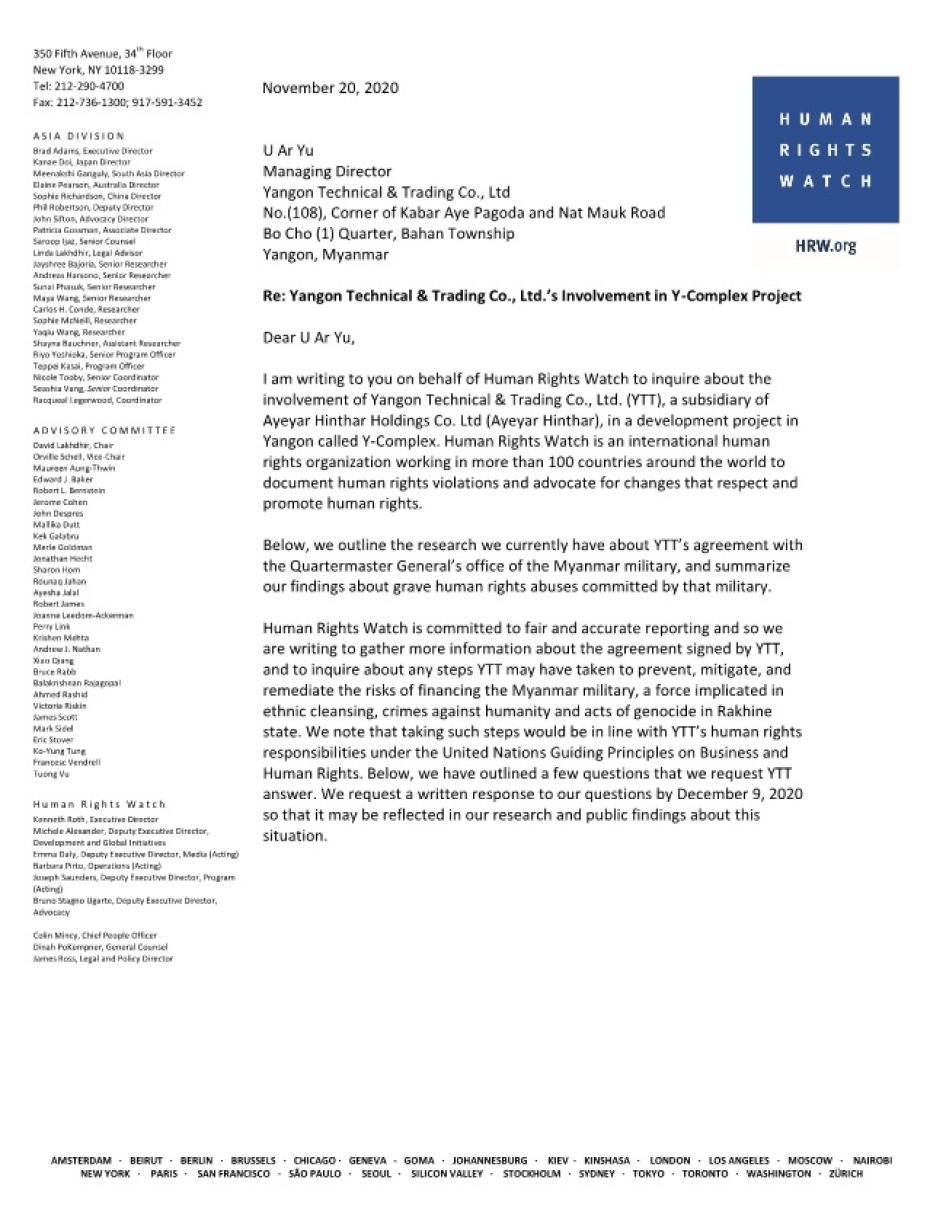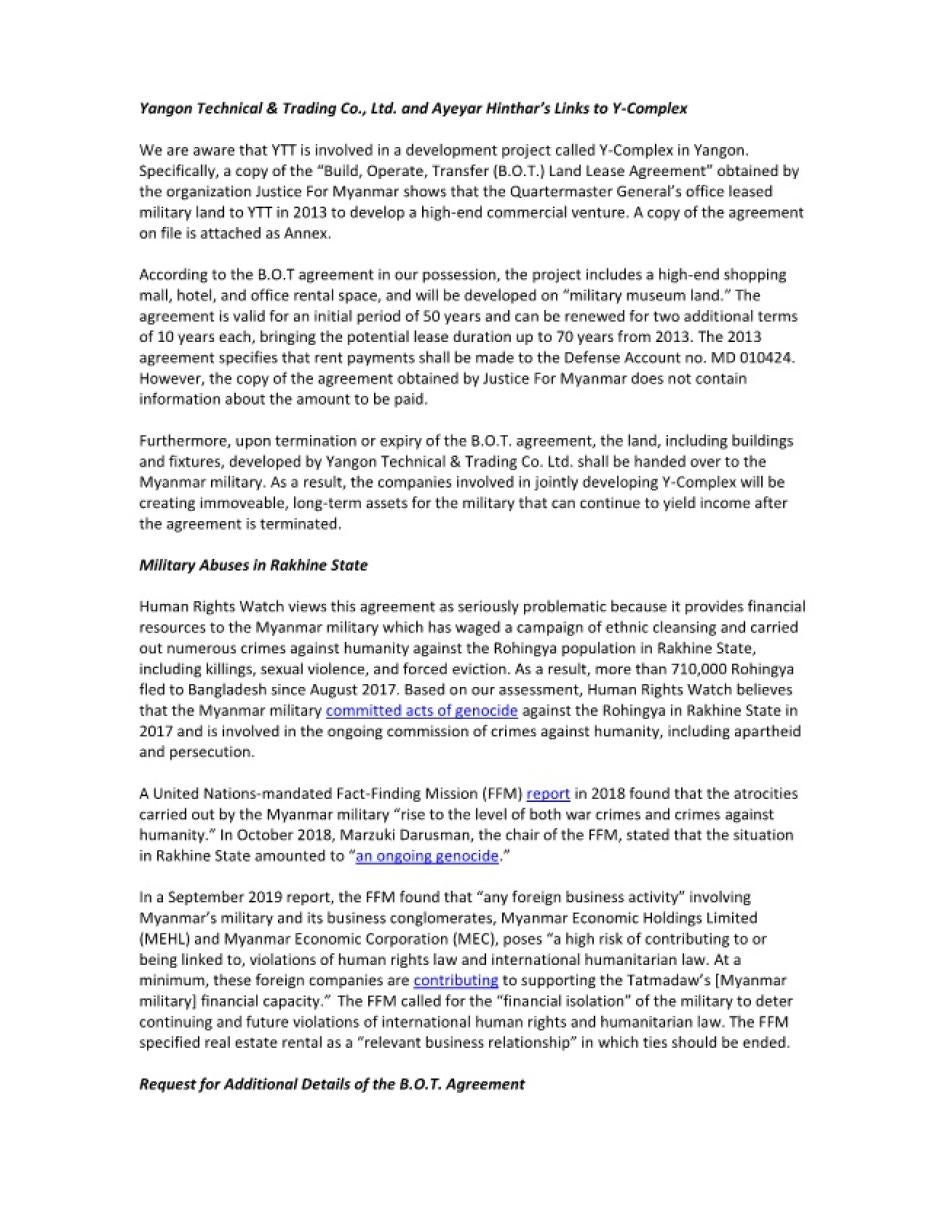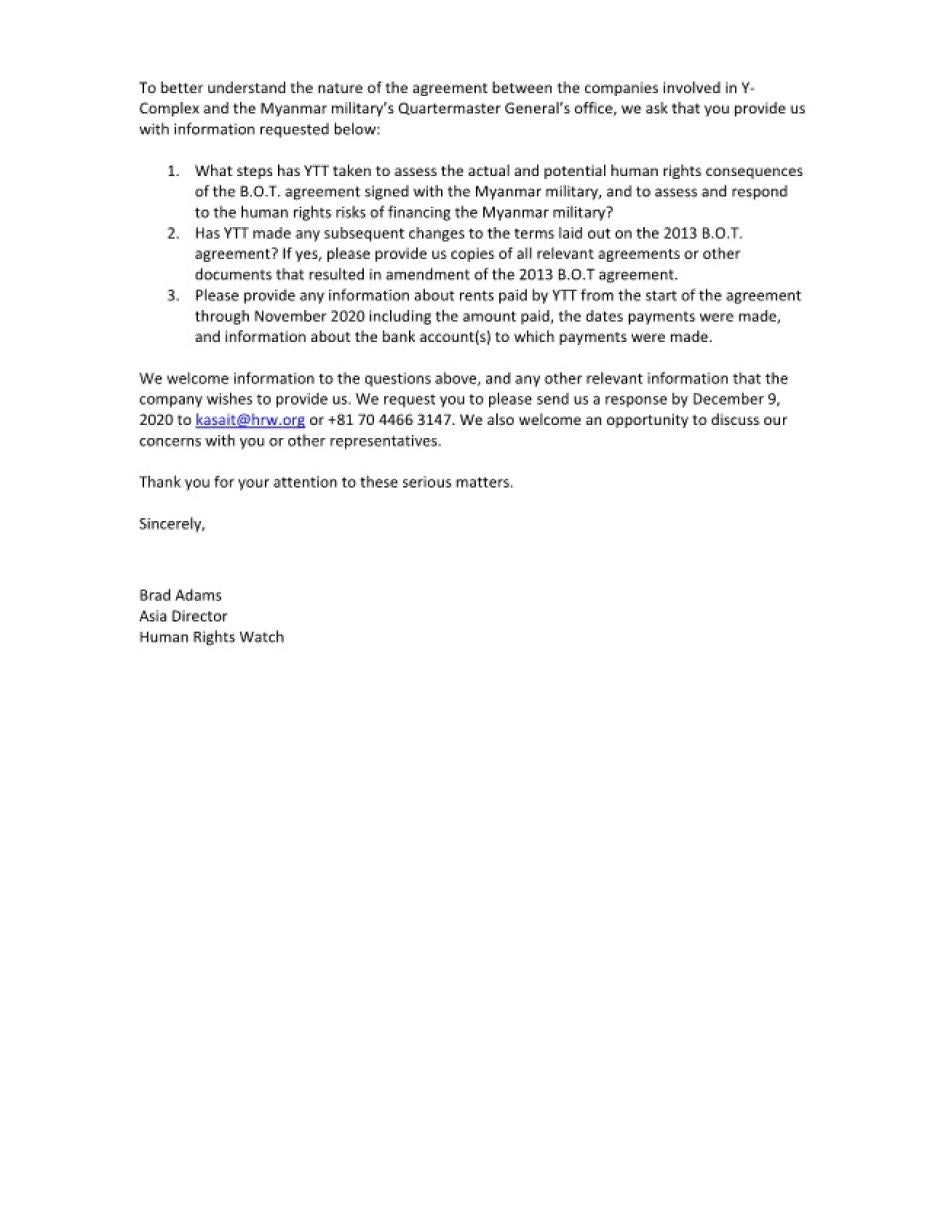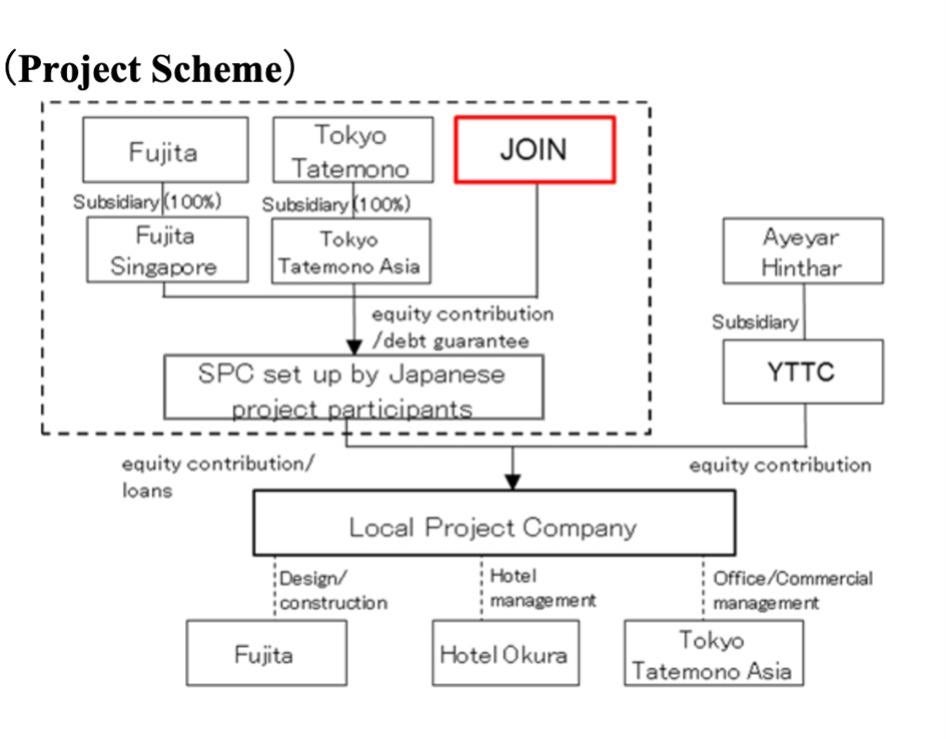February 17, 2021
Mr. Dante Pesce
Chair
Working Group on Human Rights and Transnational Corporations and Other Business Enterprises
Office of the United Nations High Commissioner for Human Rights
UNOG-OHCHR
CH-1211 Geneva 10
Switzerland
RE: Submission by Civil Society Organizations concerning Japanese Business Entities Operating in Myanmar
Dear Mr. Pesce,
We, the undersigned civil society groups, respectfully request that the UN Working Group on Human Rights and Transnational Corporations and Other Business Enterprises undertake an inquiry into the business operations of Japanese business entities involved in Y Complex, a high-end commercial development project situated in Yangon, Myanmar.
Specifically, we urge you to investigate whether Japanese business ties are financing and creating immovable assets for Myanmar’s military, which has long been implicated in crimes against humanity in Rakhine State and other grave international crimes in ethnic areas throughout Myanmar. The military on February 1, 2021, deposed the duly elected government led by the National League for Democracy (NLD), which won the November 2020 elections by a large margin. The military detained and charged President Win Myint, State Counselor Aung San Suu Kyi, and other NLD party officials and civil society activists.
We have outlined our research into Japanese companies’ involvement in developing Y Complex in Appendix I, providing other relevant documentation in appendices II to XII.
We hope the information enclosed provides sufficient basis for the Working Group to initiate an investigation and issue a report recommending the steps that the Japanese government and the companies involved need to take to cease, prevent, mitigate, and remediate the risks involved of supporting Myanmar’s abusive military. We believe this should include halting of the project until the military ends its controlling role in Myanmar’s economic and political spheres, and the military is brought under civilian control.
We would welcome an opportunity to brief you further to enable your investigation. Please contact us via Teppei Kasai of Human Rights Watch.
Thank you for your consideration regarding this important matter.
Sincerely,
Human Rights Now
Human Rights Watch
Japan International Volunteer Center
Justice For Myanmar
Mekong Watch
Appendix I: Japanese Companies Developing Y Complex[1]
Build, Operate, Transfer (B.O.T.) Agreement with Myanmar Military
A copy of the “Build, Operate, Transfer (B.O.T) Land Lease Agreement” obtained by Justice For Myanmar shows that the Quartermaster General’s office leased military land to Yangon Technical & Trading Co. Ltd in 2013 to develop a high-end commercial venture.[2] The project, which includes a shopping mall, hotel, and office rental space, will be developed on “military museum land.”[3] The same B.O.T. agreement, as well as the Environmental Impact Assessment, has been published by Myanmar’s Ayeyar Hinthar Holdings Company Limited.[4]
The B.O.T. agreement is valid for an initial period of 50 years and can be renewed for two additional terms of 10 years each, that is, for up to 70 years from 2013.[5] The agreement specifies that rent payments should be made to the Defense Account no. MD 010424.[6] Upon termination or expiry of the B.O.T. agreement, the land, including buildings and fixtures, developed by Yangon Technical & Trading Co. Ltd. should be transferred to the military.[7] Therefore, companies involved in jointly developing in Y Complex will be creating immoveable long-term assets for the military, which can continue to yield income after the agreement is terminated.
On June 22, 2020, the military’s spokesperson confirmed that the military owns the land, and the Ministry of Defense receives rental payments for the Y Complex development.[8] A translation of the relevant parts of the spokesperson’s comments are in Appendix XII.
Key Japanese Companies Involved
According to publicly available information, Y Complex is being jointly developed with the involvement of numerous Japanese companies. The precise nature of each company’s business relationship is captured through a project diagram published by the Japan Overseas Infrastructure Investment Corporation for Transport and Urban Development (JOIN), produced in Appendix X.[9]
According to the Japan Bank for International Cooperation (JBIC), it has provided US$47 million out of a total US$144 million loan, which is co-financed by Sumitomo Mitsui Banking Corporation and Mizuho Bank, Ltd.[10] Most notably, JBIC is a public financial institution wholly owned by the Japanese government.[11]
Further, JOIN published its decision to invest US$49.4 million and provide debt guarantees worth US$41.8 million “to participate in the urban development project Redevelopment of the Defence Services Museum site in central Yangon of Myanmar jointly with Fujita Corporation … and Tokyo Tatemono Co., Ltd.”[12]
Fujita Corporation states that it is responsible for planning and constructing the project.[13] As noted before, the assets created by Fujita Corporation on the land will be transferred to the Myanmar military upon the expiry of the project.
Tokyo Tatemono and Hotel Okura are providing commercial services that are central to generating revenue from the project. Tokyo Tatemono states that it “will undertake operation/management of the office and commercial facilities.”[14] Hotel Okura states that it “will open the Okura Prestige Yangon, the first Okura Hotels & Resorts member hotel to operate in Myanmar, in 2020” and further that it expects to “sign a contract in August [2017] with a local alliance” including Myanmar’s Yangon Technical & Trading Co., Ltd.[15] As of November 30, 2020, Okura Nikko Hotel Management Co., Ltd.'s website states the hotel will open in 2021.[16]
We believe the involvement of the above-mentioned Japanese business entities in a development project being built on military-owned land and leased under a “Build, Operate, and Transfer” system with the Myanmar military’s Office of the Quartermaster General will directly finance Myanmar’s abusive military and create valuable assets for them.
Failure to Conduct Human Rights Due Diligence
The Japanese companies involved in the Y Complex project have not conducted effective human rights due diligence as called for by the UN Guiding Principles on Business and Human Rights.
None of the undersigned organizations has received information or otherwise learned of the involved business entities holding any stakeholder consultations that could contribute to a human rights due diligence process to identify, cease, prevent, mitigate, and remediate the risks of financing and creating assets for Myanmar’s abusive military. Outreach efforts by Business & Human Rights Resource Centre, Human Rights Watch, and Mekong Watch to the involved business entities have not resulted in the disclosure of any meaningful information (details provided in Appendix II to VII). None of the Japanese and Myanmar business entities involved has published any information about any human rights due diligence efforts they might have conducted, or the results of those efforts.
The Guiding Principles state that “States should take additional steps to protect against human rights abuses by business enterprises that are owned or controlled by the State, or that receive substantial support and services from State agencies.”[17] On October 16, 2020, the Japanese government also announced a five-year National Action Plan on Business and Human Rights, stating that it “wishes to contribute to promoting and protecting both the human rights of people who would be adversely affected by the activities of business enterprises and human rights for society as a whole, including the international community.”[18]
Military Coup in February 2021
On February 1, 2021, the Myanmar military arrested the civilian leaders of the national and state governments and announced a one-year “state of emergency.” The military detained President Win Myint, State Counsellor Aung San Suu Kyi, and dozens of other senior officials in early morning raids in the capital, Naypyidaw. The officials were in Naypyidaw for the lower house of parliament to convene after the November 2020 national elections, which the NLD won by a large margin. The military also detained NLD officials and civil society activists in other parts of Myanmar, with the Assistance Association for Political Prisoners (AAPP) estimating that 452 people had been detained by February 16. Dozens of other human rights activists, civil society group members, and local journalists went into hiding, fearing arrest. The military also ordered the barring of access to certain social media programs, including Facebook, Messenger, Instagram, and Twitter, and messaging application WhatsApp, and cut access to the internet. While internet connectivity was restored on February 7, there has since been periodic nighttime shutdowns and widespread concerns that internet access would be cut again in the future.
Military Abuses in Rakhine State
Myanmar’s security forces have waged a campaign of ethnic cleansing, genocidal acts, and crimes against humanity against the ethnic Rohingya people in Rakhine State, including killings, sexual violence, arson, and forced eviction. As a result, more than 710,000 Rohingya have fled to Bangladesh since August 2017.
In Rakhine State, an estimated 600,000 Rohingya remain confined to camps and villages without freedom of movement, cut off from access to adequate food, health care, education, and livelihoods. About 130,000 of them have been held since 2012 in open-air detention camps. Human Rights Watch determined that the squalid and oppressive conditions imposed on the Rohingya amount to the crimes against humanity of persecution, apartheid, and severe deprivation of liberty.[19]
A UN-mandated Fact-Finding Mission (FFM) report in 2018 found that the atrocities carried out by the Myanmar military “rise to the level of both war crimes and crimes against humanity.”[20] In October 2018, Marzuki Darusman, the head of the FFM, stated that the situation in Rakhine State amounted to “an ongoing genocide.”[21]
In a September 2019 report, the FFM found that “any foreign business activity” involving Myanmar’s military and its conglomerates Myanmar Economic Holdings Limited (MEHL) and Myanmar Economic Corporation (MEC) poses “a high risk of contributing to or being linked to, violations of human rights law and international humanitarian law. At a minimum, these foreign companies are contributing to supporting the Tatmadaw’s [Myanmar’s military] financial capacity.”[22] The FFM called for the “financial isolation” of the military to deter continuing and future violations of international human rights and humanitarian law. The FFM specified real estate rental as “relevant business relationship” in which ties should be ended.
A March 4, 2020 report by Yanghee Lee, the UN Special Rapporteur on the situation of human rights in Myanmar, recommended “that companies operating in Myanmar respect human rights throughout their work and supply chains, in line with the Guiding Principles on Business and Human Rights.”[23] It added that companies “must undertake heightened due diligence, particularly regarding conflict areas, and consider declining sales if the risks are found to be too high.”[24]
The Myanmar government continues to block access to Rakhine State for most UN agencies, humanitarian organizations, human rights groups, and the independent media.
International condemnation of the military’s actions has been extremely strong. On January 23, 2020, the International Court of Justice (ICJ) unanimously adopted “provisional measures” that require Myanmar to prevent genocide in Rakhine State and take steps to preserve evidence of past crimes.[25] Just months before, in November 2019, the International Criminal Court (ICC) authorized the ICC prosecutor to investigate alleged crimes against humanity, namely deportation, other inhumane acts, and persecution against Rohingya that it ruled took place in Myanmar but were completed in Bangladesh, an ICC state party.[26]
Supporting Information: Appendices II to XII
Responses of business entities to inquiries from civil society groups
The Business & Human Rights Resource Centre contacted Tokyo Tatemono, SMBC, Mizuho Bank, Fujita, Hotel Okura, Myanmar’s Ayeyar Hinthar, and JOIN for comment on the article published by the Justice for Myanmar.[27] Copies of the companies’ responses, originally in Japanese, along with unofficial English translations provided by Business & Human Rights Resource Centre, are available in Appendix II through VII.
On June 26, 2020, Mekong Watch contacted JBIC with questions about the details of the development project, including whether the rent is being paid to the Myanmar military. On July 13, 2020, JBIC declined to answer via telephone, citing protection of commercial secrets. On August 25, Mekong Watch sent an open request letter to JBIC.[28] At the time of this writing, JBIC has yet to respond to that letter. However, at a meeting with a member of Japan’s parliament and Mekong Watch on February 4, 2021, JBIC admitted that it had confirmed with Y Complex Company Limited that the rent payments are being made to the Defense Account as indicated in the lease agreement contained in the Environmental Impact Assessment.
On November 20, 2020, Human Rights Watch also contacted Ayeyar Hinthar and Yangon Technical & Trading Co., Ltd, its subsidiary. The letter Human Rights Watch wrote to them, as well as the response by Kyi Tha, a Director of the Strategic Planning & Major Project Group of Ayeyar Hinthar Holdings is available in Appendix VIII, IX, and X.
Appendix II: Response by Japan Overseas Infrastructure Investment Corporation for Transport & Urban Development (JOIN) on September 1, 2020
“[The Y Complex project in Myanmar] was approved for investment under the new Myanmar Investment Law. As part of this project, we support business activities that comply with local laws and regulations.
Moving forward, we will continue to pay attention to environmental and social considerations in our investment projects.” – JOIN
Appendix III: Response by Tokyo Tatemono on August 31, 2020
“Our company is conducting business in Myanmar by constructing environmentally friendly buildings in order to provide urban infrastructure that contributes to the development of society and economy of Myanmar.
Y Complex PJ (‘the Project’), a real estate development project in Myanmar conducted by Y Complex Company Limited, in which we have a stake via Yangon Museum Development, has obtained an investment approval under the Myanmar New Investment Law and is conducting the Project in compliance with local laws, regulations and the guidance of the relevant authorities.
Although some of the facts in the article are different from what we recognize, we will be keeping a close eye on them.
We are currently developing our human rights policy, which is based on the Guiding Principles on Business and Human Rights, and will publish it as soon as it is developed.” – Tokyo Tatemono
Appendix IV: Response from Sumitomo Mitsui Banking Corporation on August 31, 2020
“We refrain from replying to individual cases, but we will share the comments we received internally and use this information as a reference for promoting ESG work in the future.” – Sumitomo Mitsui Banking Corporation
Appendix V: Response from Mizuho Bank on August 31, 2020
“We refrain from commenting on this as it relates to individual cases. This information has been shared with the relevant departments.” – Mizuho Bank
Appendix VI: Response from Hotel Okura on August 31, 2020
“Our company is entrusted by the Y Complex Co., Ltd. to manage hotels and service apartments in a complex (hotel, service apartments, office and commercial facilities) owned by a local company (Y Complex Co., Ltd) invested by SPC in which Fujita Corporation, Tokyo Tatemono Corporation and JOIN invested.
As an operator of hotels and service apartments, we are not in a position to comment on the organization and operation of the Y Complex Co., Ltd. However, we comply with local and Japanese laws and regulations and do our best to operate the hotel in a manner that is genuinely safe and comfortable for the people of Myanmar and visitors to Myanmar. We are pleased to contribute to the development of Myanmar's tourism industry and cities through hospitality, and this desire has not changed at all.
We will keep the contents of the article by Justice for Myanmar in mind and will continue to pay close attention to the developments in the future.” – Hotel Okura
Appendix VII: Response from Fujita on August 31, 2020
“Through our business in Myanmar, we aim to provide social infrastructure that contributes to development of society and economy by constructing buildings that will please the people of Myanmar, based on our philosophy of contributing to the economic activities and improving the lives of the people of Myanmar.
With regard to the real estate development project ‘Y Complex PJ,’ Y Complex Company Limited, in which we have a stake via the Yangon Museum Development Pte. Ltd., has obtained an investment license in Myanmar based on the New Investment Law of Myanmar and operates in compliance with local laws and regulations and the guidance of the relevant authorities.
We will continue to monitor the points raised in the article. We will pursue the realization of a society where human rights are respected through our business in accordance with our human rights policy.” – Fujita
Appendix VIII: Letter to Ayeyar Hinthar by Human Rights Watch
Appendix IX: Letter to Yangon Technical & Trading Co., Ltd. by Human Rights Watch
Appendix X: Response from Ayeyar Hinthar Holdings on December 28, 2020
The following response was sent to Human Rights Watch by Ayeyar Hinthar Holdings via email.
1. YTT has not taken special steps to assess the actual and potential human rights consequences of the BOT agreement.
2. There have been no changes to the terms laid out in the BOT agreement.
3. The other information you have requested cannot be disclosed without the consent of the lessor.
Appendix XI: Diagram by JOIN[29]
(This graph is from July 28, 2017, and does not illustrate the involvement of JBIC, Sumitomo Mitsui Banking Corporation, and Mizuho Bank, Ltd.)
Appendix XII: Myanmar military spokesperson’s comments during a June 22, 2020 press conference confirming that the military owns the land which Y-Complex is being developed on.
Around the 7:21 mark, accessible here: https://www.facebook.com/watch/live/?v=935042153633335
“What I can tell you now is that - all the money we get from this project goes to the defense ministry.”
[1] Tokyo Tatemono Asia, “Y Complex,” https://www.yc-ys.com.mm/ (accessed November 19, 2020).
[2] Justice For Myanmar, “The Luxury Japanese Business Development Secretly Funding Myanmar’s Military,” May 22, 2020 (accessed November 19, 2020).
[3] “Appendix II B.O.T System Land Lease Agreement,” https://uploads-ssl.webflow.com/5e691d0b7de02f1fd6919876/5ec6b2dc075fe31ea6b96843_y-complex-lease-agreement.pdf, Clause 4(a) (accessed November 19, 2020).
[4] Ayeyar Hinthar, “Environment Impact Assessment,” July, 2019, http://ayeyarhinthar.com/pdf/Environmental%20Impact%20Assessment%20Report%20of%20Y%20Complex%20Project.pdf (accessed November 30, 2020).
[5] “Appendix II B.O.T System Land Lease Agreement,” https://uploads-ssl.webflow.com/5e691d0b7de02f1fd6919876/5ec6b2dc075fe31ea6b96843_y-complex-lease-agreement.pdf, clause 4(b), (accessed November 19, 2020).
[6] Ibid., clause 5(f), (accessed November 19, 2020).
[7] Ibid., clause 8, (accessed November 19, 2020).
[8] Myanmar Now, June 22, 2020, https://www.facebook.com/watch/live/?v=935042153633335&ref=watch_permalink (accessed November 19, 2020).
[9] Japan Overseas Infrastructure Investment Corporation for Transport & Urban Development, “JOIN Supports the Urban Development Project - Redevelopment of the Defence Services Museum site - in Central Yangon,” http://www.join-future.co.jp/images/topics/1602825053/1602825053_20001.pdf (accessed November 19, 2020).
[10] Japan Bank for International Cooperation, “Loan for Mixed Use Development Project by Japanese Company in Myanmar,” December 18, 2018, https://www.jbic.go.jp/en/information/press/press-2018/1218-011714.html (accessed November 19, 2020).
[11] Japan Bank for International Cooperation, “Corporate Governance,” https://www.jbic.go.jp/en/about/governance.html (accessed November 19, 2020).
[12] Japan Overseas Infrastructure Investment Corporation for Transport & Urban Development, “JOIN Supports the Urban Development Project - Redevelopment of the Defence Services Museum site - in Central Yangon,” http://www.join-future.co.jp/images/topics/1602825053/1602825053_20001.pdf (accessed November 19, 2020).
[13] Fujita Corporation and Tokyo Tatemono Co., Ltd,” Development/Operation Led by Japanese Public-Private Partnership Launching of Large-Scale Complex Development Project in the Center of Yangon, Myanmar,” July 28, 2017, https://www.tatemono.com/english/news/pdf/20170728.pdf (accessed November 19, 2020).
[14] Ibid.
[15] Okura Nikko Hotel Management Co., Ltd., “The Okura Prestige Yangon to Open in 2020,” July 28, 2017, https://www.okura-nikko.com/press/20170728_okura-prestige-yangon/ (accessed November 19, 2020).
[16] Okura Nikko Hotel Management Co., Ltd., “The Okura Prestige Yangon [Opening 2021],” https://www.okura-nikko.com/myanmar/yangon/the-okura-prestige-yangon/ (accessed February 9, 2021).
[17] UN Human Rights Office of The High Commissioner, Guiding Principles on Business and Human Rights,” 2011, principle 1B(4), https://www.ohchr.org/documents/publications/guidingprinciplesbusinesshr_en.pdf (accessed November 19, 2020).
[18] Ministry of Foreign Affairs of Japan, “Launch of Japan’s National Action Plan on Business and Human Rights,” October 16, 2020, https://www.mofa.go.jp/press/release/press4e_002939.html (accessed December 1, 2020).
[19] Human Rights Watch, “An Open Prison without End,” October 8, 2020, https://www.hrw.org/report/2020/10/08/open-prison-without-end/myanmars-mass-detention-rohingya-rakhine-state (accessed November 19, 2020).
[20] UN Human Rights Council, “Myanmar: UN Fact-Finding Mission releases its full account of massive violations by military in Rakhine, Kachin and Shan States,” September 18, 2018, https://www.ohchr.org/EN/HRBodies/HRC/Pages/NewsDetail.aspx?NewsID=23575&LangID=E (accessed November 19, 2020).
[21] UN News, “Accountability for atrocities in Myanmar ‘cannot be expected’ within its borders – UN investigator,” October 24, 2018, https://news.un.org/en/story/2018/10/1024062 (accessed November 19, 2020).
[22] United Nations Office of the High Commissioner for Human Rights, “The economic interests of the Myanmar military,” September 2019, para. 6(d) https://www.ohchr.org/Documents/HRBodies/HRCouncil/FFM-Myanmar/EconomicInterestsMyanmarMilitary/A_HRC_42_CRP_3.pdf (accessed November 19, 2020).
[23] UN Office of the High Commissioner for Human Rights, “Report of the Special Rapporteur on the situation of human rights in Myanmar,” March 4, 2020, para. 79(g), https://www.ohchr.org/EN/HRBodies/HRC/RegularSessions/Session43/Documents/A_HRC_43_59_AdvanceUneditedVersion.docx (accessed November 19, 2020).
[24] Ibid.
[25] International Court of Justice, “Application of the Convention on the Prevention and Punishment of the Crime of Genocide,” January 23, 2020, https://www.icj-cij.org/public/files/case-related/178/178-20200123-ORD-01-00-EN.pdf (accessed November 19, 2020).
[26] International Criminal Court,” ICC judges authorise opening of an investigation into the situation in Bangladesh/Myanmar,” November 14, 2019, https://www.icc-cpi.int/Pages/item.aspx?name=pr1495 (accessed November 19, 2020).
[27] Business & Human Rights Resource Centre, “Myanmar: Japanese cos. allegedly engaged in high-end commercial development on land owned by Burmese military currently facing UN genocide charges,” September 2, 2020, https://www.business-humanrights.org/en/latest-news/myanmar-japanese-cos-allegedly-engaged-in-high-end-commercial-development-on-land-owned-by-burmese-military-currently-facing-un-genocide-charges/ (accessed November 19, 2020).
[28] Mekong Watch, “Request for Explanation on the Flow of Funds and Human Rights Issues regarding the Real Estate Project in Myanmar (Commonly Known as the Y Complex Project),” August 25, 2020, http://www.mekongwatch.org/PDF/rq_20200825_Eng.pdf (accessed November 19, 2020).
[29] Japan Overseas Infrastructure Investment Corporation for Transport & Urban Development, “JOIN Supports the Urban Development Project - Redevelopment of the Defence Services Museum site - in Central Yangon,” July 28, 2017, http://www.join-future.co.jp/images/topics/1602825053/1602825053_20001.pdf (accessed November 30, 2020).
